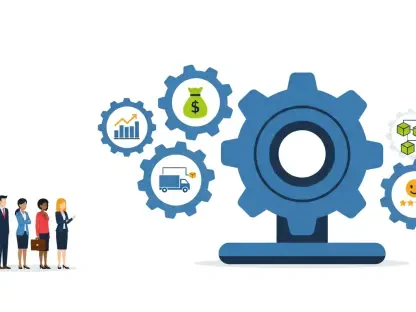In the rapidly evolving landscape of enterprise software, a significant transformation is underway, driven by the Model Context Protocol (MCP), a new artificial intelligence integration standard. This profound shift is reshaping interactions across business-to-business (B2B) and software-as-a-service (SaaS) platforms by challenging established paradigms of data ownership and accessibility. AI’s emergence as a primary interface, evidenced by systems like ChatGPT, is catalyzing this change, directing user focus away from conventional applications and toward integrated, intelligent platforms. As more individuals engage with AI interfaces, the practical necessity of traditional systems, such as Customer Relationship Management (CRM) systems, is diminishing. The narrative around this transition argues that AI’s growing utility in managing data supersedes traditional records, creating friction over data ownership between software vendors and customers. Salesforce’s recent decision to restrict Slack data access exemplifies this conflict, sparking widespread discussion about the rightful ownership of data within applications. Such moves illustrate the potential resistance from SaaS companies defending their data lock-in models, a practice increasingly challenged by the global trend toward openness and interoperability.
AI Interfaces Reshape Data Accessibility
AI’s ascent as a central interface in enterprise software heralds a new era where traditional data management systems may no longer hold as much sway. As AI tools like ChatGPT redefine user interactions, the traditional framework of how data is handled and accessed is being reevaluated, shifting the focus from proprietary systems to more accessible and versatile solutions. This paradigm shift suggests that traditional software vendors need to adapt quickly to maintain relevance in this rapidly advancing technological landscape. Salesforce’s strategic decision to limit access to Slack conversations highlights a growing tendency among vendors to protect their data territories, igniting debates about the ownership and access to data. Such moves raise important questions about the perceived ownership rights between customers and vendors, a debate further inflamed by AI’s ability to bypass vendor-controlled interfaces. The repercussions of this unfolding situation emphasize the urgency for vendors to reconsider their strategies in response to customer demands for greater accessibility and integration of their data. As customers become more accustomed to AI-driven platforms, their expectations are increasingly centered on seamless data integration, emphasizing the need for interoperability over rigid vendor lock-ins.
The Rise of Customer Empowerment
Entrenched data defense practices by legacy vendors are facing increased scrutiny as customers push back against conventional barriers to data accessibility. For many years, these vendors successfully maintained control over data by leveraging the cost and complexity associated with migrating large volumes of information, but the rise of AI is gradually dismantling this pseudo-monopoly. Customers are swiftly embracing alternative analysis platforms, freeing themselves from vendor constraints. Leveraging AI tools like ChatGPT for analyzing Salesforce data exemplifies this trend, facilitating customer empowerment through unhindered access and analysis of their data outside traditional vendor channels. The emergence of open and interconnected systems reflects customers’ desire for more agile and flexible solutions. This progression unveils a critical development: customers are no longer satisfied with traditional modes of engagement, driving demand for systems that prioritize compatibility, integration, and ease of switching vendors. Companies that align with MCP standards by adopting open data paradigms stand poised to attract new buyers, fostering a shift toward experience-focused offerings rather than restrictive data models.
The Dynamic Tension Between Vendors
The current enterprise software ecosystem indicates a dichotomy between data-centric and workflow-focused vendors. Companies like Salesforce, whose models rely heavily on proprietary data management, could face reduced relevance in an era where data portability and interoperability are becoming the norm. In contrast, workflow-oriented platforms such as Slack or Figma may continue to thrive by delivering unique user experiences unclouded by data constraints. Vendors that embrace MCP effectively create competitive advantages through enhanced data accessibility, appealing to customers’ evolving expectations. Vendors like HubSpot exemplify this shift by actively supporting MCP, centering their business models around improved user experiences, and embracing open data practices. The strategic emphasis on fluid and transparent data management allows these companies to navigate the industry transformation, challenging vendors resistant to change. As customers increasingly demand open data, workflow-centric approaches, and seamless integration, vendors must adapt swiftly or risk obsolescence. The interplay between these contrasting paradigms reflects a broader shift toward an interconnected, data-driven future.
Shifting Paradigms and Strategic Insights
Current trends within the enterprise software community suggest a possible tipping point toward embracing open protocols as standard requirements. Vendors who lag in adopting MCP and ensuing technological shifts may confront severe repercussions by failing to adapt to a new open and transparent ecosystem. Historical data reveals a timeline through which MCP adoption unsettles established norms, encouraging customers to demand more versatile workflows and comprehensive data access. Companies attuned to these transformations by aligning their offerings with MCP receive considerable benefits, positioning themselves as industry leaders. The path forward for enterprise vendors necessitates forsaking the proprietary data model in favor of delivering experience-driven value propositions. This evolution encourages competitors to recognize the imperative of enriching customer experiences by innovating beyond conventional software models. Vendors historically reliant on defending data barriers must reconsider their operational frameworks to sustain growth, creating a technology ecosystem focused on integration and interoperability rather than control. In this shifting paradigm, enterprises that proactively adopt open data practices strengthen their market position and ensure substantial improvement in user satisfaction.
Conclusion
In the dynamic world of enterprise software, the Model Context Protocol (MCP) is driving a significant transformation as a new AI integration standard. This shift is radically altering interactions on business-to-business (B2B) and software-as-a-service (SaaS) platforms, challenging traditional ideas about data ownership and accessibility. The rise of AI as a primary interface—through systems like ChatGPT—is steering users away from traditional applications toward integrated, intelligent platforms. As more individuals utilize AI interfaces, traditional systems like CRM are becoming less essential. The growing role of AI in managing data reshapes the conversation around data ownership, creating tension between software vendors and customers. This is highlighted by Salesforce’s recent move to restrict Slack data access, stirring debate on data ownership within applications. SaaS companies defending their data lock-in models may face resistance, as the trend leans toward openness and interoperability in data management.









